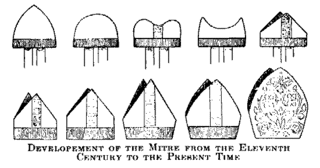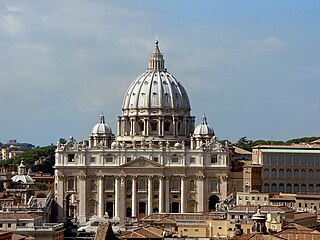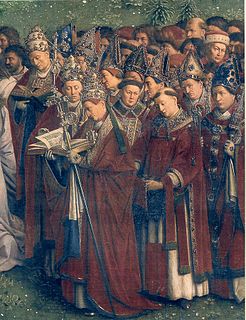
An episcopal polity is a hierarchical form of church governance in which the chief local authorities are called bishops. It is the structure used by many of the major Christian Churches and denominations, such as the Catholic, Eastern Orthodox, Oriental Orthodox, Church of the East, Anglican, Lutheran and Methodist churches or denominations, and other churches founded independently from these lineages.
The Roman Curia comprises the administrative institutions of the Holy See and the central body through which the affairs of the Catholic Church are conducted. The Roman Curia is the institution which the Roman Pontiff ordinarily makes use of in the exercise of his supreme pastoral office and universal mission in the world. It is at the service of the Pope, successor of Peter, and of the Bishops, successors of the Apostles, according to the modalities that are proper to the nature of each one, fulfilling their function with an evangelical spirit, working for the good and at the service of communion, unity and edification of the Universal Church and attending to the demands of the world in which the Church is called to fulfill its mission.

The Second Ecumenical Council of the Vatican, commonly known as the Second Vatican Council, or Vatican II, was the 21st ecumenical council of the Roman Catholic Church. The council met in St. Peter's Basilica in Rome for four periods, each lasting between 8 and 12 weeks, in the autumn of each of the four years 1962 to 1965. Preparation for the council took three years, from the summer of 1959 to the autumn of 1962. The council was opened on 11 October 1962 by John XXIII, and was closed on 8 December 1965 by Paul VI.

A synod is a council of a Christian denomination, usually convened to decide an issue of doctrine, administration or application. The word synod comes from the Greek: σύνοδος [ˈsinoðos] meaning "assembly" or "meeting" and is analogous with the Latin word concilium meaning "council". Originally, synods were meetings of bishops, and the word is still used in that sense in Catholicism, Oriental Orthodoxy and Eastern Orthodoxy. In modern usage, the word often refers to the governing body of a particular church, whether its members are meeting or not. It is also sometimes used to refer to a church that is governed by a synod.

The magisterium of the Roman Catholic Church is the church's authority or office to give authentic interpretation of the Word of God, "whether in its written form or in the form of Tradition." According to the 1992 Catechism of the Catholic Church, the task of interpretation is vested uniquely in the Pope and the bishops, though the concept has a complex history of development. Scripture and Tradition "make up a single sacred deposit of the Word of God, which is entrusted to the Church", and the magisterium is not independent of this, since "all that it proposes for belief as being divinely revealed is derived from this single deposit of faith."
An episcopal conference, sometimes called a conference of bishops, is an official assembly of the bishops of the Catholic Church in a given territory. Episcopal conferences have long existed as informal entities. The first assembly of bishops to meet regularly, with its own legal structure and ecclesial leadership function, is the Swiss Bishops' Conference, which was founded in 1863. More than forty episcopal conferences existed before the Second Vatican Council. Their status was confirmed by the Second Vatican Council and further defined by Pope Paul VI's 1966 motu proprio, Ecclesiae sanctae.

The Joint Declaration on the Doctrine of Justification (JDDJ) is a document created and agreed to by the Catholic Church's Pontifical Council for Promoting Christian Unity (PCPCU) and the Lutheran World Federation in 1999 as a result of extensive ecumenical dialogue. It states that the churches now share "a common understanding of our justification by God's grace through faith in Christ." To the parties involved, this essentially resolves the 500-year-old conflict over the nature of justification which was at the root of the Protestant Reformation. The World Methodist Council adopted the Declaration on 18 July 2006. The World Communion of Reformed Churches, adopted the Declaration in 2017.
A base community is a relatively autonomous Christian religious group that operates according to a particular model of community, worship, and Bible study. The 1968 Medellín, Colombia, meeting of Latin American Council of Bishops played a major role in popularizing them under the name basic ecclesial communities. These are small groups, originating in the Catholic Church in Latin America, who meet to reflect upon scripture and apply its lessons to their situation.
Conciliarity is the adherence of various Christian communities to the authority of ecumenical councils and to synodal church governance. It is not to be confused with conciliarism, which is a particular historical movement within the Catholic Church. Different churches interpret conciliarity in different ways.
Sensus fidei, also called sensus fidelium is, according to the Catechism of the Catholic Church, "the supernatural appreciation of faith on the part of the whole people, when, from the bishops to the last of the faithful, they manifest a universal consent in matters of faith and morals." Quoting the document Lumen gentium of the Second Vatican Council, the Catechism adds: "By this appreciation of the faith, aroused and sustained by the Spirit of truth, the People of God, guided by the sacred teaching authority,... receives... the faith, once for all delivered to the saints. ...The People unfailingly adheres to this faith, penetrates it more deeply with right judgment, and applies it more fully in daily life." The foundation of this can be found in Jesus' saying in Mt 16:18 that "the gates of Hell will not prevail against it," where "it" refers to the "Church", that is, the Lord's people that carries forward the living tradition of essential beliefs throughout history, with the Bishops overseeing that this tradition does not pursue the way of error.

In the liturgical traditions of the Catholic Church, the term ordination refers to the means by which a person is included in one of the orders of bishops, priests or deacons. The teaching of the Catholic Church on ordination, as expressed in the 1983 Code of Canon Law, the Catechism of the Catholic Church, and the apostolic letter Ordinatio sacerdotalis, is that only a Catholic male validly receives ordination, and "that the Church has no authority whatsoever to confer priestly ordination on women and that this judgment is to be definitively held by all the Church's faithful." In other words, the male priesthood is not considered by the church a matter of policy but an unalterable requirement of God. As with priests and bishops, the church ordains only men as deacons.

Athanasius Schneider, ORC is a Catholic prelate, serving as the Auxiliary Bishop of Astana in Kazakhstan. He is a member of the Canons Regular of the Holy Cross of Coimbra. He is known for championing the pre-Vatican II liturgical traditions and practices of the Church and for protesting certain current policies, including some associated with Pope Francis.

Johannes Nicolaas Maria Wijngaards is a Catholic scripture scholar and a laicized priest.

The All India Catholic Union (AICU) represents almost 16 million Catholics in India: followers of the Latin Rite, the Syro-Malabar Catholics and the Syro-Malankara Catholics. It has 120 diocese and district units. The AICU was established in 1930.
In the Catholic Church, the Synod of Bishops, considered as an advisory body for the pope, is one of the ways in which the bishops render cooperative assistance to him in exercising his office. It is described in the 1983 Code of Canon Law as "a group of bishops who have been chosen from different regions of the world and meet at fixed times to foster closer unity between the Roman Pontiff and bishops, to assist the Roman Pontiff with their counsel in the preservation and growth of faith and morals and in the observance and strengthening of ecclesiastical discipline, and to consider questions pertaining to the activity of the Church in the world."
Remy Denis is an Indian mathematician who was elected president of the All India Catholic Union (AICU) in September 2008, succeeding John Dayal. He was reelected at the annual general meeting of the AICU held in Mangalore in September 2010.

The Fourteenth Ordinary General Assembly of the Synod of Bishops, popularly referred to as the Synod on the Family, took place from 4 to 25 October 2015 with the theme of "the vocation and mission of the family in the Church and in the contemporary world." It was "reflect[ing] further on the points discussed" at the 2014 Third Extraordinary General Assembly of the Synod of Bishops "so as to formulate appropriate pastoral guidelines" for the pastoral care of the person and the family. The 2014 assembly of the synod, called to define the status quaestionis and to collect the participants' experiences and proposals, can be understood as a preparation for the 2015 assembly, but they are meant to "form a single organic unity." It took place in the Synod Hall in the Paul VI Audience Hall in Vatican City.
In the Roman Catholic Church, collegiality refers to "the Pope governing the Church in collaboration with the bishops of the local Churches, respecting their proper autonomy." In the early church the popes sometimes exercised moral authority rather than administrative power, and that authority was not exercised extremely often; regional churches elected their own bishops, resolved disputes in local synods, and only felt the need to appeal to the Pope under special circumstances.
The Wijngaards Institute for Catholic Research is a British "progressive" think tank producing research on controversial issues within contemporary Roman Catholic theology. It does so by coordinating an international network of academics, most of whom are Roman Catholic.

The Synodal Path is a series of conferences of the Catholic Church in Germany to discuss a range of contemporary theological and organizational questions concerning the Catholic Church, as well as possible reactions to the sexual abuse crisis in the Catholic Church in Germany.









